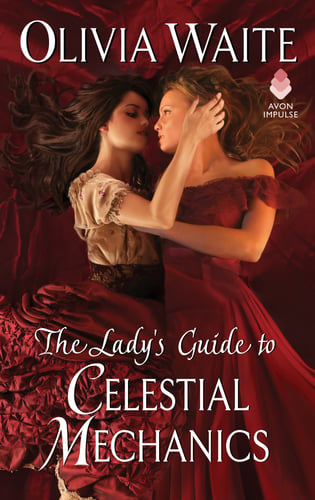I was really excited about this book because I am an Olivia Waite fangirl. I love her column on the Seattle Review of Books, and she’s one of the people I recommend heavily in my work at the library. So when I saw she was coming out with a queer historical with science ladies, I knew I should take a chance on it. And I’m happy I did! The Lady’s Guide to Celestial Mechanics is a delight. I read it at a time when I was super stressed out and needed some relief during Big Life Stuff, and Catherine and Lucy’s story was like a warm, safe weighted blanket at the end of the day.
I went into it ready to read about the homophobia and “gay pain” Catherine and Lucy would face as a couple. But instead, Waite decides to focus on the community they build together and shows that their trusted friends, family, and Catherine’s servants don’t care if they are together. More than one character has had a same-sex relationship, and it’s not a shocking secret. The pain these couples experience stems from the fact that they cannot be married, or the expectations families put upon them to get married and produce heirs (which is, unfortunately, a pain many people still face today).
The fact that Waite combined a historical setting with a modern context made me enjoy this book, despite the fact I’m not always a historical fan. It’s tough for me to see myself, a biracial queer person, in historicals set in the Regency period because my very existence would have been frowned upon. But the combination of Waite’s exploration of English society and Catherine and Lucy’s crusade against sexism in the science society they are apart of made it a safe place for me to enjoy the story.
I also appreciated that Waite didn’t shy away from discussing the classism and colonialism of the time. She makes mention of the different ethnicities of Catherine’s household, and Catherine herself explains the atrocities men within the English scientific community have committed against indigenous peoples. It’s important to remember that most “scientific discoveries” in this period (and for decades after) were at the cost of native peoples, ecosystems, and lands. I think this is something many historical writers gloss over, and it was refreshing to see a character be woke enough to acknowledge the terrible cost of “progress.”
Both Lucy and Catherine struggle to be accepted - Lucy is a worthy, intelligent astronomer who isn’t recognized by the broader scientific community because of her gender, and Catherine creates beautiful embroidery but doesn’t value her work as art. I loved that though the love they have for each other helps them find acceptance, it’s the work that they do for themselves that helps them earn it. Waite represents science and art equally and seeing this couple discover their passion for each is so beautiful. I’ll be looking forward to Waite’s other books in the series, and you should be too!
Content Warnings: misogyny, constant gaslighting from men, deceased partner, emotional and physical abuse in a marriage
Amy received a free copy of the e-book via Goodreads from the publisher.


